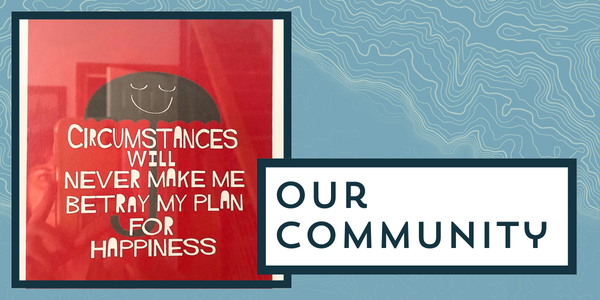Meet our Community: Susan
- Thrive Central Oregon

- Nov 6, 2025
- 3 min read

"Our story is probably not unlike quite a few families," said Susan. When Susan began working with Community Outreach Advocate Cam nearly a year ago in December, she was living in her car with her son, and it was getting cold outside.
Susan and her son had lost their previous rental and struggled to find another rental they could afford. At first, they were living in B&Bs while they searched, but when weeks became months, that also became too expensive. At the time, Susan had just retired and was living on a fixed income. Her adult son is on the Autism Spectrum, and she was helping him apply for Social Security Disability as well.
Moving into her car was meant to save money for move-in costs, but it was scary and cold. They spent the winter living in her car, until one day a friend suggested she go to a Thrive drop-in site. Susan first connected with Thrive through a drop-in site in Bend and began working with Cam.
Says Susan, "What a phenomenal advocate. He helped us create a plan and fill out very complicated forms. He researched every option and supported us in staffing meetings. He is so kind and patient."
Cam and Susan worked together to apply for affordable housing and the Housing Choice Voucher as waitlists opened. But, as we well know, waitlists aren't quick. While in the application process, Susan experienced a medical emergency.
Susan describes this huge hurdle in the process of applying to housing: "We were in the process of filling out paperwork when I had a very serious medical emergency. I almost didn’t make it, but the emergency team at St Charles saved my life. I was hospitalized for several weeks and moved to rehab, all while Cameron kept us moving forward. We were finally accepted by the apartment complex, and then the application journey began. What a doozy. It took months of Cameron pushing forward until we got a move-in date."
Even when an applicant comes to the top of a waitlist at an apartment complex, it doesn't guarantee an immediate move-in. At the very least, this can take a week, but often it can take much longer due to a variety of factors: criminal and rental screening time, credit checks, the previous tenant not moving out when expected, the unit needing repairs, management changes, etc. For Susan, she knew she would eventually move into an apartment - but it took nearly 7 months from when she was first called. Though this isn't standard, it shows just how much stress folks endure while actively trying to move into housing.
Luckily, while she waited, she was accepted into the Stepping Stone shelter - a low-barrier, long-term transitional shelter in Bend. Susan calls Stepping Stone "another fantastic program" that provided a lifeline for her and her son when they needed it.
Today, Susan and her son have moved into their new apartment and are taking time to take care of themselves. She thanks Cam for all of his work over the past year, stating,
"I could not have done this on my own. Cameron moved us forward when I could not even get out of bed. He did an amazing job and we will always be grateful to Thrive and Cameron."
Susan, we are so grateful to you for sharing your story with our community. You endured so much over the past couple of years - we wish you peace and warmth going into winter this year ❤️


Comments